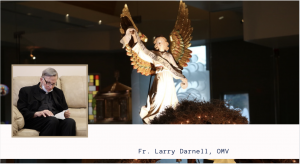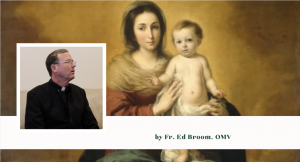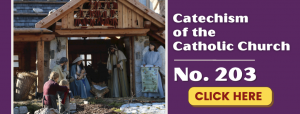Tuesday of the Fourth Week of Advent


PART ONE: LISTEN TO RETREAT TALK ON FACEBOOK FORUM WITH FR. LARRY AND FR. ED
PART TWO: MEDITATE ON THE SON OF GOD BECAME MAN BY FR. LARRY DARNELL, OMV
PART THREE: POINTS OF MEDITATION ON GOSPEL AND LESSONS FROM THE CHILD JESUS: GOD’S WISDOM! By Father Ed Broom, OMV

Catechism of the Catholic Church
The Son of God Became Man
Paragraph 1 – Why Did The Word Become Flesh?
456 – With the Nicene Creed, we answer by confessing: “For us men and for our salvation he came down from heaven; by the power of the Holy Spirit, he became incarnate of the Virgin Mary, and was made man.”
457 – The Word became flesh for us in order to save us by reconciling us with God, who “loved us and sent his Son to be the expiation for our sins”: “the Father has sent his Son as the Savior of the world”, and “he was revealed to take away sins”: Sick, our nature demanded to be healed; fallen, to be raised up; dead, to rise again. We had lost the possession of the good; it was necessary for it to be given back to us. Closed in the darkness, it was necessary to bring us the light; captives, we awaited a Savior; prisoners, help; slaves, a liberator. Are these things minor or insignificant? Did they not move God to descend to human nature and visit it, since humanity was in so miserable and unhappy a state?
458 – The Word became flesh so that thus we might know God’s love: “In this the love of God was made manifest among us, that God sent his only Son into the world, so that we might live through him.” “For God so loved the world that he gave his only Son, that whoever believes in him should not perish but have eternal life.”
459 – The Word became flesh to be our model of holiness: “Take my yoke upon you, and learn from me.” “I am the way, and the truth, and the life; no one comes to the Father, but by me.” On the mountain of the Transfiguration, the Father commands: “Listen to him!” Jesus is the model for the Beatitudes and the norm of the new law: “Love one another as I have loved you.” This love implies an effective offering of oneself, after his example.
460 – The Word became flesh to make us “partakers of the divine nature”: “For this is why the Word became man, and the Son of God became the Son of man: so that man, by entering into communion with the Word and thus receiving divine sonship, might become a son of God.” “For the Son of God became man so that we might become God.” “The only-begotten Son of God, wanting to make us sharers in his divinity, assumed our nature, so that he, made man, might make men gods.”
Letter of St. Paul to the Philippians 2:1-11
If there is any encouragement in Christ, any solace in love, any participation in the Spirit, any compassion and mercy, complete my joy by being of the same mind, with the same love, united in heart, thinking one thing.
Do nothing out of selfishness or out of vainglory; rather, humbly regard others as more important than yourselves, each looking out not for his own interests, but [also] everyone for those of others.
Have among yourselves the same attitude that is also yours in Christ Jesus, Who, though he was in the form of God, did not regard equality with God something to be grasped.
Rather, he emptied himself, taking the form of a slave, coming in human likeness; and found human in appearance, he humbled himself, becoming obedient to death, even death on a cross.
Because of this, God greatly exalted him and bestowed on him the name that is above every name, that at the name of Jesus every knee should bend, of those in heaven and on earth and under the earth, and every tongue confess that Jesus Christ is Lord, to the glory of God the Father.

“For greater things you were born.” (Ven. Mother Luisita)
TUESDAY, DECEMBER 22nd Lk. 1: 46-56 Mary said: “My soul proclaims the greatness of the Lord, and my spirit rejoices in God my Savior, for he has looked with favor on his lowly servant.”
Part 1: Poverty of Jesus, Son of God made man by St. Peter Julian Eymard
Part 2: LESSONS FROM THE CHILD JESUS: GOD’S WISDOM! By Father Ed Broom, OMV
PART 1: The Poverty of Jesus, Son of God made man. From the writings of St. Peter Julian Eymard as presented by Fr. John Hardon, S.J.
Of the virtues Our Lord in the Eucharist is now practicing in order to inspire us to follow His example, none is more basic than His poverty. Jesus wanted to be the poorest of the poor, in order to be able to stretch out His hand to the lowliest of men and say to them, “I am your brother.”
Consider… No man was ever born in more wretched conditions than the Word Incarnate, who had the trough of animals for His cradle, their shelter for His home. As a child, He fed on barley bread, the bread of the poor. In the hidden years He took up the awl and the hammer to earn bread by the sweat of His brow. During His apostolic life He lived on alms. He died in a state of destitution that will never be equaled… stripped of His garments, His honor, His Divinity hidden!
Now that He is risen and glorious, He still takes poverty for His companion… Jesus, dwelling in our midst in His Sacrament, is poorer than during the days of His mortal life! His home is often but a poor church, worse perhaps than the cave of Bethlehem, where His tabernacle may consist of nothing more than four boards, which themselves are worm-eaten! His priests or His faithful people must give Him everything: the matter of the Sacrament, the bread and the wine; the linen on which to place Him or with which to cover Him; the corporals, the altar cloths. He brings nothing from heaven except His adorable Person and His love! Silent, obedient, humbly waiting in the tabernacle for His faithful to come visit Him… for His ministers to take Him out for adoration, to visit the sick, to be viaticum for the dying.
What is Jesus teaching us? He’s teaching us that He is to be imitated twice over: once as the God-man who lived a mortal life in Palestine and once again as the same Incarnate God who is now living His glorified life in the Blessed Sacrament… in poverty, silence, humility, obedience, compassion, merciful forgiveness, love.
Christ is to be followed and His virtues imitated here and now as they are lived by Him in the Holy Eucharist in our midst! The Eucharistic Presence of Jesus is the Mystery of Faith that we are called upon not only to venerate and adore, but to model our lives on in this valley of tears as a condition of reaching our heavenly home.
PART 2: LESSONS FROM THE CHILD JESUS: GOD’S WISDOM! By Father Ed Broom, OMV
Jesus stated it very clearly: “Unless you become like a child you cannot enter into the Kingdom of Heaven.” (Mt. 18:3) Also, on one occasion when the Apostles were trying to prevent the children from coming to Jesus, the Lord said forcefully: “Let the children come to me; if you do not become like a little child you cannot enter the Kingdom of God.” (Mt. 19:14)
OUR LADY OF FATIMA AND CHILDREN. One of the most famous modern approved apparitions is that of Our Lady of Fatima. God sent His Mother from heaven to a little town in Portugal, called Fatima, in the year 1917, six times from May 13 through October 13. Who did Our Lady appear to? The brilliant? The scholars? The rich and important? The flashy and ostentatious? To none of these did Our Lady appear. Rather, she appeared to three little children—tenders of sheep, and with no formal education! God’s ways are not our ways—this is certain!
GOD’S PROVIDENTIAL DESIGN. God could have chosen any one of limitless possibilities as a means to ransom or save humanity after the sin of our first parents, Adam and Eve, the sin that we call Original Sin. God could have come as a powerful King, or a rich millionaire, or a brilliant genius, or a plethora of other flashy, fantastic ways! But no! God’s ways are as different from our ways as heaven is from the earth! In His Providential design, God willed to save the world by what theologians call The Incarnation—meaning? God willed to become one of us, to become a man like us with this exception—He was born without sin, lived a sinless life, and died on the cross to save us from our sins!
AS A CHILD. Furthermore, God willed to enter the world by the same means by which we entered the world—through a woman. God chose Mary to be the channel by which He would enter humanity. The Ever Virgin Mary conceived Jesus through the power of the Holy Spirit and maintained her virginity even in the moment of giving birth to Jesus.
THE CHILD JESUS —THE SON OF GOD. Jesus was the baby born of Mary. This Virgin Mother took Him in her tender arms, wrapped Him in swaddling clothes, and nestled Him close to her most pure and Immaculate Heart. Then Mary placed Jesus on the hay in the manger. The word manger comes from French and means to eat! It was the feeding trough of the animals. Later on, as an adult, Jesus would challenge people to nourish themselves on His Body and Blood if they wanted to live, and live forever. I am the Bread of life. Whoever eats my Body and drinks my Blood will have everlasting life and I will raise Him up on the last day. (Jn. 6: 22-71—Bread of Life discourse).
BETHLEHEM: HOUSE OF BREAD. There are no coincidences or unexpected circumstances in God’s providential designs. The word Bethlehem actually means House of Bread. No surprise that Jesus, who was born in the city of the House of Bread, would declare Himself the Bread of life and challenge us that our eternal salvation hinges upon our consuming Him in Mass and Holy Communion as the Bread of Life.
IMPORTANT LESSONS FROM THE CHILD JESUS.
There are many lessons to learn from God becoming man, being in the womb of Mary for nine months, and finally being born as a little Baby. Let us dig deep into this goldmine and derive abundant treasures for our meditation, imitation, transformation, sanctification, and perseverance! What then are the lessons of the Infant-Child Jesus?
1. DEPENDENCY. Even though the Baby Jesus was God, the Son of God made man, still He made Himself totally dependent on others, most especially Mary and Saint Joseph. Jesus would live this attitude of dependency on His Heavenly Father during the whole course of His life! In our spiritual lives we must develop and cultivate a child-like dependency on God in all times, places, and circumstances. In the Sermon on the Mount, Jesus challenges us to trust by contemplating nature—the lilies of the field and the birds of the air. “Look at the birds of the air; they do not sow or reap or store away in barns, and yet your heavenly Father feeds them. Are you not much more valuable than they? Can any one of you by worrying add a single hour to your life? And why do you worry about clothes? See how the lilies of the field grow. They do not labor or spin. Yet I tell you that not even Solomon in all his splendor was dressed like one of these.” (Mt. 6: 36-39) In His Public life Jesus had no permanent home, saying: “The foxes have their holes and the birds of the air their nests, but the Son of man has nowhere to rest His head.” (Lk. 9: 58) Again, total trust in the Father!
2. HUMILITY. The littleness of the Infant Jesus is an extraordinary example of humility. God loves the humble but casts down the mighty from their thrones. Mary’s Magnificat: “My soul glorifies the Lord and my spirit rejoices in God my Savior, for he has been mindful of the humble state of his servant.” (Lk. 1: 46-55). He chose the Pharisee over the Publican, humility over an overweening pride. (Lk. 18:9-14) When a man, on one occasion Jesus described His own Sacred Heart using these two descriptions: I am meek and humble of heart… (Mt.11:29) Arrogance, conceit, haughtiness, and self-importance are all alien to the person of the child, and most especially the Child-Jesus! May He inspire us to pursue a life of great humility!
3. GOD ALONE! Once again, even though Jesus was, is, and always will be God, the second Person of the Blessed Trinity, He chose to enter the portals of this world not in a palace, castle, or opulent mansion. On the contrary, He entered this world being born in a stable that served as a refuge for animals. A good part of the warmth of that little cave was the presence, the heat, and the breath of the animals there! We must learn that pursuing money, possessions, power and esteem will not fill us with authentic Joy. Pleasure that passes, yes, but true and lasting Joy, no! The Child Jesus born in Bethlehem teaches us to find true happiness not in the created world, but in the Creator of the world—Jesus the Lord. Venerable Archbishop Fulton Sheen penned it so eloquently: The Creator of the universe had no place to be born in His own creation!
4. INNOCENCE. In a world where innocence is being lost, even among our children due to an uncontrolled use of modern technology, the Infant Jesus teaches us clearly and unequivocally the importance of striving to live lives of innocence—freedom from sin. Still more, the Innocent Child Jesus in the arms of Mother Mary challenges us to strive to protect the innocence of our children threatened by so many modern wolves!
5. CHILDLIKE SIMPLICITY: INSPIRING TRUST. In the overly complicated world that we have created, we should all long for a more simple, humble, frugal, transparent, as well as detached life-style. Models for us would be Saint Francis of Assisi, Saint Mother Teresa of Calcutta, and the children of Fatima—Saint Jacinta Marto, Saint Francisco Marto, and their cousin, Servant of God Lucia de los Santos. By contemplating the Little Baby Jesus resting peacefully in the arms of Mary, His loving Mother, may we learn to strive for Evangelical Poverty and simplicity. Saint Ignatius of Loyola points out that nobody is afraid to approach an innocent little baby—a strong, aggressive warrior, yes!—but not an innocent little Baby.
May the Infant-Baby Jesus resting in the loving and tender arms of His Mother Mary inspire us to greater trust, greater dependency on God, greater humility, greater simplicity, and a life of detachment from things so that we can be totally anchored and rooted in God!
Copyright 2020 Oblates of the Virgin Mary
St. Peter Chanel Church, Hawaiian Gardens, CA

